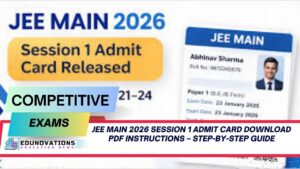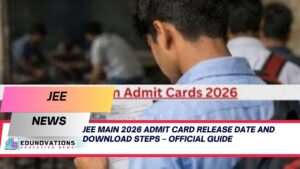CBSE Board: The Central Board of Secondary Education (CBSE) has taken a decisive step to curb the rising trend of students enrolling in dummy schools. The board has announced that students found registered in such institutions will be disqualified from appearing in CBSE board exams. This move is part of the board’s effort to restore academic credibility and prevent malpractices in school enrollment.
In this article, we will cover the CBSE’s new regulations, their impact on students and schools, and what this means for the future of board examinations in India.
What Are Dummy Schools?
Dummy schools refer to educational institutions that enroll students only on paper, without providing regular classroom education. Students registered in such schools often take coaching classes elsewhere, particularly for competitive exams like JEE and NEET, while skipping formal school attendance.
Why Are Dummy Schools Problematic?
- Violation of Academic Standards: Dummy schools undermine the core purpose of school education by bypassing classroom learning and participation.
- Unfair Advantage: Students attending dummy schools gain extra preparation time for competitive exams, putting regular schoolgoers at a disadvantage.
- Lack of Holistic Development: Dummy school students miss out on extracurricular activities, teamwork, and essential skill-building experiences.
- Compromised Attendance Records: Since dummy schools do not require regular attendance, they violate CBSE’s mandatory attendance norms.
CBSE Board Strict Measures: What Has Changed?
In its latest directive, the CBSE Board has declared that students enrolled in dummy schools will be barred from appearing in board exams. Here’s what the new rules entail:
✅ Strict Verification of Enrollment
CBSE has instructed all affiliated schools to verify the enrollment status of students thoroughly. Schools will need to submit genuine student records, including:
- Attendance reports reflecting regular classroom participation.
- Academic performance records from internal assessments.
- Proof of physical attendance, such as biometric logs or CCTV footage.
❌ Disqualification from CBSE Board Exams
Students found enrolled in dummy schools will be:
- Banned from appearing in Class 10 and 12 board exams.
- Disqualified from CBSE-affiliated certifications, potentially affecting their future education prospects.
- Subjected to academic scrutiny, with possible cancellation of prior year results.
🔍 School Audits and Penalties
CBSE will conduct surprise audits on schools to identify dummy enrollments. Schools found guilty of running such practices will face:
- Hefty fines and disaffiliation from CBSE.
- Legal actions for violating education norms.
- Possible blacklisting, preventing them from operating as CBSE-affiliated institutions.
Why Is CBSE Board Cracking Down on Dummy Schools?
1. Ensuring Academic Integrity
CBSE Board aims to promote holistic learning by ensuring students actively participate in school activities and classroom education.
2. Leveling the Playing Field
By discouraging dummy school enrollments, CBSE Board seeks to create a fairer academic environment for all students.
3. Compliance with Education Norms
The board is committed to enforcing strict compliance with academic regulations, preventing schools from exploiting loopholes.
4. Aligning with National Education Policy (NEP)
The new regulations align with the NEP 2020, which emphasizes experiential learning, classroom participation, and skill development.
Impact on Students and Parents
🎓 For Students
- Genuine Students Benefiting: Those enrolled in regular schools will benefit from equal opportunities during board exams.
- Reduced Coaching Reliance: With fewer dummy school enrollments, students will be encouraged to prioritize classroom learning over coaching.
- Impact on Competitive Exam Prep: Students who previously opted for dummy schools to focus on JEE or NEET prep will need to reconsider their strategies.

👨👩👧👦 For Parents
- Increased Accountability: Parents will need to ensure their children are enrolled in genuine, CBSE-affiliated schools.
- Potential Admission Scrutiny: Schools may tighten admission criteria, making it harder for parents to bypass attendance rules.
- Awareness of Legal Implications: Parents knowingly enrolling their children in dummy schools may face legal consequences.
How Schools Will Be Affected
🏫 Enhanced Compliance Requirements
Schools will need to maintain accurate attendance records and submit detailed reports to CBSE.
⚠️ Risk of Disaffiliation
Schools found promoting dummy enrollments could face disaffiliation, fines, or legal action.
💡 Improved Academic Standards
With stricter monitoring, schools will be encouraged to improve teaching quality and uphold academic standards.
CBSE Board Efforts to Promote Academic Integrity
To further strengthen its educational reforms, CBSE plans to implement:
✅ Digital Attendance System
- Introduction of biometric attendance systems to prevent dummy enrollments.
- Regular monitoring through CBSE’s online portal.
📚 Surprise School Inspections
- Random inspections to identify schools violating enrollment norms.
- Scrutiny of student attendance and academic records.
🛑 Cancellation of Affiliation
Schools found repeatedly violating CBSE norms will face cancellation of affiliation, affecting their reputation and operations.
Expert Opinions on CBSE’s Move
👩🏫 Educational Experts
- Dr. Ramesh Chandra, education policy expert, states: “CBSE’s decision to disqualify dummy school students is a much-needed step to ensure fairness in board exams. It will promote genuine academic engagement.”
- Prof. Nidhi Sharma, school principal, adds: “The focus should be on encouraging students to prioritize classroom learning. Dummy schools undermine the essence of education.”
Key Takeaway: A New Era of Transparency in CBSE Board Exams
CBSE’s strict action against dummy school enrollments aims to restore credibility and fairness in board examinations. With enhanced monitoring, schools and students will be held accountable, ensuring authentic learning experiences.
For students and parents, this means greater emphasis on regular schooling over coaching-centric approaches. As CBSE enforces these measures, the education system is set to become more transparent and credible.
✅ Internal and External Links
- For NCERT Courses: Edunovations NCERT Courses
- For Current Affairs: Edunovations Current Affairs
- For Notes: Edunovations Notes
- For MCQs: Edunovations MCQs
- For Videos: Edunovations Videos
- For Syllabus: Edunovations Syllabus
- For Free NCERT PDFs: Download NCERT PDFs
- For NCERT Mind Maps: Download NCERT Mind Maps
- External Reference: School Website Development









